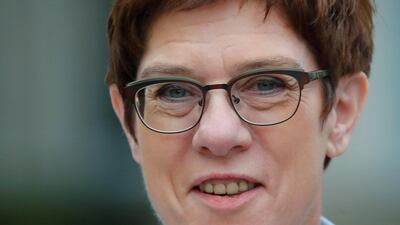Three men are challenging to take over from Angela Merkel as German chancellor after the woman groomed to be her successor dropped out of the race.
Defence minister Annegret Kramp-Karrenbauer, will step down as the leader of the ruling Christian Democratic Union (CDU) after a series of mis-steps and an internal rebellion that dogged her 14-month reign as party chief.
The search for a successor is likely to pit the leader of the industrial North Rhine-Westphalia, Armin Laschet, who is most likely to continue Mrs Merkel’s centrist policies against two men who have the support of more conservative elements of the party’s membership.
Health minister Jens Spahn was the most outspoken critic of Mrs Merkel’s liberal immigration policies.
Friedrich Merz is a veteran of battles with Mrs Merkel and lost the battle to succeed her in 2018 that allowed Ms Kramp-Karrenbauer to take over.
The decision upset Mrs Merkel’s plans for a smooth succession to the defence minister after leading Germany for more than 15 years. Mrs Merkel has said she will not run for a fifth term in Germany's next general election, which is scheduled for autumn 2021.
Ms Kramp-Karrenbauer’s decision to drop out of the race comes at an uncertain time for Germany and the wider European Union following Brexit and an increasing challenge from nationalist leaders to shift political course of the bloc.
The most pressing of the issues they have to address is how to deal with Germany’s far-right, which contributed to Ms Kramp-Karrenbauer’s demise.
The final controversy that led to her stepping aside came after regional party officials in the state of Thuringia ignored her orders not to side with a far-right party in elections aimed at ousting a left-wing governor. The move to back Alternative for Germany (AfD) – unheard of in modern post Second World War politics - undermined her leadership.
“The AfD stands against everything we as the CDU represent,” Ms Kramp-Karrenbauer told reporters on Monday in Berlin.
AfD has established itself as a powerful far-right force since it was founded in 2013 but most of its rivals have ruled out working with the party in a coalition government. The party wants tighter immigration controls and tolerated anti-Semitism.
Manfred Weber, the German leader of a centre-right bloc in the European parliament, told daily newspaper Welt that the situation in Thuringia reflected a Europe that “is in a phase of growing instability; politics is becoming more serious”.
It is a sign of growing instability among the parties of the middle all across Europe. The parties of the middle must draw their red line to those with radical right tendencies,” Mr Weber said. “This approach from Kramp-Karrenbauer was and is correct.”

